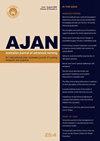COVID-19大流行对澳大利亚护士和助产士的心理社会影响:一项横断面研究
IF 1.3
4区 医学
Q3 NURSING
引用次数: 0
摘要
目的:调查COVID-19大流行对在急症护理机构工作的护士和助产士的心理社会影响,特别是心理困扰、自我报告的担忧以及对其工作和个人生活的感知影响。背景:人们对大流行对澳大利亚护士和助产士的心理社会影响知之甚少,澳大利亚的COVID-19病例和死亡人数远低于其他许多国家。调查大流行期间护士心理困扰普遍程度的研究很少在一个以上的环境中进行,特别是在澳大利亚的情况下。研究设计和方法:横断面调查设计(STROBE检查表)。澳大利亚墨尔本四个大城市三级卫生服务机构的护士和助产士(n=1,611)在2020年5月15日至8月31日期间完成了一项匿名在线调查,评估了抑郁、焦虑和压力的症状(DASS-21);与COVID-19有关的关切;以及COVID-19的其他影响。为自由文本注释提供了空格。结果:大约五分之一的答复者报告了中度至极严重的抑郁、焦虑和压力症状。较少的临床经验与较高程度的心理困扰显著相关。超过一半的受访者非常/非常担心将COVID-19传染给家庭成员和家人的健康,近一半的受访者担心照顾确诊或疑似COVID-19的患者。答复者报告说,个人防护装备(PPE)等某些预防措施干扰了他们提供最佳患者护理的能力。还报告了大流行病的积极方面,包括工作人员之间的团结和合作意识。结论:2019冠状病毒病大流行对澳大利亚墨尔本急症护理机构的护士和助产士的心理健康、工作和个人生活产生了相当大的影响,尤其是那些临床经验较少的护士和助产士。对护理和卫生服务研究、政策和实践的影响:护士和助产士,特别是那些临床经验较少的护士和助产士,将受益于额外的、有针对性的福利和支持举措。对于那些经验不足的人,可以主动与经验更丰富的同事和教育工作者合作,他们可以提供实际和情感上的支持,并监测他们的压力水平。关于这个话题我们已经知道了什么?在COVID-19大流行期间,护士和助产士比其他卫生保健工作者经历了更多的心理困扰。关于COVID-19大流行对护士和助产士的社会心理影响的大多数研究都是在单一卫生服务机构进行的。很少有研究同时调查了来自不同卫生服务机构的护士和助产士在COVID-19大流行期间的经历,特别是在澳大利亚。尽管澳大利亚的COVID-19病例和死亡人数相对较低,但COVID-19大流行对澳大利亚护士和助产士的心理健康、工作和个人生活产生了相当大的影响。在接受调查的护士和助产士中,约有五分之一的人报告说,在大流行的第一波期间,他们出现了中度至极严重的抑郁、焦虑和压力症状。临床经验较少的护士和助产士比经验丰富的护士和助产士经历了更高程度的心理困扰。本文章由计算机程序翻译,如有差异,请以英文原文为准。
Psychosocial impact of the COVID-19 pandemic on Australian nurses and midwives: a cross-sectional study
Objective: To investigate the psychosocial effects of the COVID-19 pandemic on nurses and midwives working in acute care settings, specifically psychological distress, self-reported concerns, and perceived impact on their work and personal lives. Background: Little is known about the psychosocial impact of the pandemic on nurses and midwives in Australia, a country with a substantially lower number of COVID-19 cases and deaths than many others. Few studies investigating the prevalence of psychological distress among nurses during the pandemic have been conducted in more than one setting, especially in the Australian context. Study design and methods: Cross-sectional survey design (STROBE checklist). Nurses and midwives (n=1,611) at four metropolitan tertiary health services in Melbourne, Australia completed an anonymous online survey between 15 May and 31 August 2020, which assessed symptoms of depression, anxiety and stress (DASS-21); concerns related to COVID-19; and other effects of COVID-19. Space was provided for free-text comments. Results: Approximately one fifth of respondents reported moderate to extremely severe symptoms of depression, anxiety and stress. Fewer years of clinical experience were significantly associated with higher levels of psychological distress. More than half of the respondents were extremely/very concerned about passing COVID-19 on to family members and about their family's health, and almost half were concerned about caring for a patient who had confirmed or suspected COVID-19. Respondents reported that certain precautionary measures such as personal protective equipment (PPE) interfered with their ability to provide optimal patient care. Positive aspects of the pandemic were also reported including a sense of togetherness and cooperation among staff. Conclusion: The COVID-19 pandemic has had a considerable impact on the psychological wellbeing and work and personal lives of nurses and midwives working in acute care settings in Melbourne, Australia, particularly those with less clinical experience. Implications for nursing and health services research, policy and practice: Nurses and midwives, particularly those with less clinical experience, would benefit from additional, targeted wellbeing and support initiatives. For those with less experience, initiatives could include being partnered with more experienced colleagues and educators who can provide practical and emotional support and monitor their stress levels. What is already known about the topic? Nurses and midwives have experienced more psychological distress than other healthcare workers during the COVID-19 pandemic. Most studies about the psychosocial impact of the COVID-19 pandemic on nurses and midwives have been conducted in a single health service. Few studies have concurrently investigated the experiences of nurses and midwives from different health services during the COVID-19 pandemic especially in the Australian context. What this paper adds Despite the relatively low number of COVID-19 cases and deaths in Australia, the COVID-19 pandemic has had a considerable impact on the psychological wellbeing and work and personal lives of Australian nurses and midwives. About one in five of the nurses and midwives surveyed reported moderate to extremely severe symptoms of depression, anxiety and stress during the first wave of the pandemic. Nurses and midwives with fewer years of clinical experience experienced higher levels of psychological distress than those with more experience.
求助全文
通过发布文献求助,成功后即可免费获取论文全文。
去求助
来源期刊
CiteScore
2.30
自引率
7.10%
发文量
27
审稿时长
>12 weeks
期刊介绍:
The Australian Journal of Advanced Nursing publishes a wide variety of original research, review articles, practice guidelines, and commentary relevant to nursing and midwifery practice, health- maternity- and aged- care delivery, public health, healthcare policy and funding, nursing and midwifery education, regulation, management, economics, ethics, and research methodology. Further, the journal publishes personal narratives that convey the art and spirit of nursing and midwifery.
As the official peer-reviewed journal of the ANMF, AJAN is dedicated to publishing and showcasing scholarly material of principal relevance to national nursing and midwifery professional, clinical, research, education, management, and policy audiences. Beyond AJAN’s primarily national focus, manuscripts with regional and international scope are also welcome where their contribution to knowledge and debate on key issues for nursing, midwifery, and healthcare more broadly are significant.

 求助内容:
求助内容: 应助结果提醒方式:
应助结果提醒方式:


